Text
HELLO UNIVERSE I AM READY FOR GOOD THINGS TO HAPPEN TO ME NOW!!!!!!
290K notes
·
View notes
Text
Applying To Medical School Series- Part Two: How To Do Well In The UKCAT
I’m not really going to go into why Universities use the UKCAT or give you the pros and cons of doing it- what I will say is that I personally thought it was pointless and a massive waste of time, I thought Abstract Reasoning was a pile of poop, had absolutely no idea why I had to do it and hated it even MORE after sitting the test since it was the only section I scored less than 750 in and so it dragged down my entire average.
That said, I WILL give you some advice on how to do well in it. Bearing in mind that it’s not too difficult content wise and given enough time, you could probably all score over 800 in every section. The difficulty comes in balancing accuracy with speed. My key advice is going to be PRACTICE! A lot of the questions are very similar, test the same things but with different phrasing or have the same patterns. The more questions you do, the more familiar you will become with all of these and the easier you will find it to identify these in the actual test.
So let’s begin.
Verbal Reasoning
1) True-False-Can’t Tell
DO NOT READ THE PASSAGE. Don’t even skim it. Why would you waste your time on such a thing?
Read the statement, decide what it means and then find the keyword. Keyword identification is critical. Use dates, events, places, jargon and specific terminology etc. Essentially, words you think were probably directly lifted from the passage.
Now skim the passage and see if you can find it. Use the tip of your pen to run along the lines as you do this, it makes you read faster and also makes sure you don’t accidentally skip a line. If you can’t, pick a different keyword or look for synonyms.
Now that you’ve found the relevant section with your keyword in it, decide what it is saying to determine if it is directly agreeing with the statement (this doesn’t necessarily mean it’ll word for word say the same thing, just that the meaning is the same. It’s like when a patient will give you their symptoms “weird tingling down my arm" and you have to decide what precise medical sign this is), directly contradicting the statement or if you need more information to determine whether the statement is true or false in which case you can’t tell.
For can’t tell, remember that just because something is common knowledge, you can’t put true/false. The paragraph has to tell you it. Just as you can’t assume that just because a patient has lung cancer, they’re a smoker. Even if evidence tells you they most likely are.
Be VERY careful about words like “always”, “never” and “sometimes” as they can often turn a “True" sentence into a “Can’t Tell" or even a “False”.
2) Single Best Answer
Again, look for a keyword in the sentence and see if this lets you answer the question. If not, you’re going to have to look for keywords in the statements and start looking for those. These are the questions you FLAG AND MOVE ON from, ready to come back later.
This is key advice for all sections of the UKCAT. If something is taking too much time, flag it and come back to it later. There’s a button at the end of each section that lets you go back through questions you flagged so USE IT.
Other than that, my only real advice for SBA is essentially the same as for T/F/CT. Assess the meaning, look for keywords and see if the two match up.
Quantitative Reasoning
If you’re already doing practice questions then you already know that a lot of the questions are very similar, testing the same formulae and ultimately asking the same question but just changing up the actual numbers or phrasing used. It might be a good idea to make a note of these formulae which keep coming up and ensure that you really understand them. Maybe look them up in your physics or maths textbooks and do the practice questions in there until you really get it. You should know s=d/t, unit conversions, basic geometric formulae for areas and volume, scaling, finding the mean/ratios/percentages/ percentage change etc. and be able to do questions on these almost instantly so that you have more time left to come back to the questions which are multi-step.
Speaking of multiple step questions- the flag is your friend! The simple questions you know exactly how to answer straight away should be your first priority. If you scan a question and can’t tell within a few seconds what it is you need to do/ realise that you’re going to need to do several calculations, flag it and move on.
Work on your mental maths to save even more time. Take a paper you’ve already done and assuming the first time round you did it to time, this time don’t. Look over the questions and try to get to the answer without using a calculator. The on-screen calculator is AWFUL so the less you have to use it, the better. If you’re practicing tests with a calculator, use a stupid, slow online one instead of the one you use at school so you have a better idea of just how ANNOYING it really is. And JUST how much it slows you down. You’ll find that by practicing your mental maths skills, you’ll be able to do those questions without using a calculator and ultimately save many, many valuable seconds in the actual thing.
To help with this, rounding is also your friend. When you have two ridiculous looking numbers, round one number up and one number down to the nearest number ending in 0s which is easy for you to work with. So 3256 + 173 you could round to 3300 + 200. You then look for an answer which is close to 3500 and only if one isn’t obviously correct (usually one is), do you waste time actually adding the individual digits.
If you Google “mental maths tricks/ tips” then you get a lot of time saving methods. One which has helped me endlessly over the years is the x11 trick. 43 x 11= 4(4+3)3= 473. If they add up to more than 10, like 56 x 11, the 1 just gets added to the first digit. 56 x 11= 5(5+6)6= 5(11)6= 616. There are loads more.
When you do get to the more difficult ones, make sure you jot down values on the whiteboard as you go along so that you don’t make mistakes there and can quickly go back through the values if your answer isn’t an option and you think maybe you mistyped a value on the STUPID ON-SCREEN SACK OF POOP CALCULATOR.
Abstract Reasoning
I bloody hated this section and that’s primarily because it was the only stage for which I had no particular system.
I asked a friend who aced this section and this is more or less their advice.
HAVE A SYSTEM.
Look at the Shapes- is there a particular shape that is always there, is there one symmetrical shape in every set, do they all have straight sides, check angles to see if there’s a pattern there, is a certain shape always bigger than the rest, or maybe that’s the pattern itself. Maybe all the shapes are the same size.
Then look at Colour- are particular shapes all one colour, is there at least one shape of a certain colour in every set, maybe one colour is absent in a set, maybe a particular shape is patterned in a specific way.
Move on to, Number- the number of shapes in each box of a set, sides, angles, numbers which are coloured in, sequences etc. etc.
And finally, check the Placement- of the shapes. Where it is in the box and where it is in relation to other shapes, remember to check rotation as well.
So remember to SCaN for Placement.
And always remember, it could be a combination. The only way you get better at recognising these combos is to practice and get used to seeing what different combinations look like.
Not just ignoring the section and hoping you’ll be able to wing it in the real thing which is what I did and so can tell you categorically DOES NOT WORK. I recognise my advice here is pretty sparse. If anyone who does well in this section wants to add some tips, feel free to do so, or message me (on Anon if you like) then I’d be more than happy to add them.
Decision Analysis
The whiteboard is essential in this section.
I always found English to code quite easy. You look for the key words in the sentence (nouns and verbs) and see what the translation is. If they have an equivalent in the code but aren’t in one or two of the options, you can immediately get rid of it. Then it’s just a matter of which translation hasn’t added random words or gotten rid of any.
Be aware of synonyms, words with multiple meanings and approximations/ combinations. So “man” could be “old boy” and “animal” could be “negative plant (not a plant)”. Similarly, be aware of code translations with multiple meanings, using “negative plant”, as an example- it could translate to not a plant, OR it could translate to animal OR even just expressing a dislike of plants. This is why, when translating code to English, it’s usually best to quickly jot down the exact translation as given and then work out logically which option seems the most sensible.
Ones where you’re given a sentence and have to decide which word should be added to the language, I would probably recommend flagging and coming back to- unless of course, it’s obvious. Because this way you can focus on trying to see if YOU can come up with a combination of code words which together give the approximate meaning of a particular word.
Situational Judgement Test
This wasn’t in my UKCAT the year I did it, but from what I’ve read up on and what I can see from all the examples online, you have to judge the Appropriateness of an action or the Importance of taking something into consideration in a given scenario.
A lot of this kind of seems pretty obvious to me, but I guess it isn’t obvious to everyone. So basically, don’t be a dick.
You have to deal with something as quickly as possible while remaining professional, in a way which doesn’t upset or offend people. If you’re correcting someone else’s mistake, do it in a way which doesn’t humiliate them, and remember your own education and free time is important and you shouldn’t have to sacrifice yourself for others. You should always be honest but remember that doctors should have each others’ backs so you should always try to encourage someone to be honest and come forward about a mistake themselves rather than turn them in, and if you do turn them in, turn them in to your immediate superior NOT some official disciplinary committee or to a patient.
For importance, remember that patient safety always comes first, and you must follow guidelines. You also HAVE to maintain confidentiality, you CANNOT do anything unless you have consent and if something dangerous is happening, you have to do what needs to be done to stop it.
General Tips
The Flag is your best friend! Anything you find difficult, Flag and come back to it. Rack up as many sure and easy points as you can before coming back to work through the more challenging ones.
A LOT of the UKCAT is about recognising patterns and styles of question so start preparing early so that you can recognise these straight away when you see them in the real thing. A lot of the time, you’ll find that the real thing is actually easier than a lot of the practice questions in the books.
Since it’s an on-screen test, be sure to do at least a few online practice papers and get used to the official format and USING THAT STUPID CALCULATOR (I’m bitter even this many years later).
Good luck everyone, and if you have any other questions- I am but an Ask away :)
88 notes
·
View notes
Text
Applying to Medical School (UK) Masterpost
I made this for personal reference when I was doing my A Levels, but now I’m a medical student. Hopefully it’s helpful if you’re considering applying to medical school :)
General
BMA (British Medical Association) on applying to medical school (one // two)
BMA FAQs about becoming a doctor
2020 entry requirements for medical schools by Medical Schools Council
All the Medicine courses that you can apply to via UCAS
Tips from the medics:
Applying to medical school by @quilavastudy
Getting into medical school by @infives
Tips for applying to medical school by @wildfiredheart
Choosing a medical school by The Medic Portal
The different types of course: traditional // integrated // PBL (problem-based learning)
Okay so I found the most amazing thing on The Medic Portal: a medical school comparison table. You enter up to 4 medical schools that you are interested in, and then you can compare their requirements / interview style / course structure etc. I love it!
Grades
GCSEs
I have a GCSEs masterpost here, and my tips for GCSEs here. But don’t worry about them too much, as different universities weight different parts of your application more or less. Medical schools that value GCSEs a lot include Oxford and Birmingham. The most important thing is to apply to medical schools strategically based on your strengths, so as long as you have a good set of GCSE results (according to the BMA at least 8 As), you’re good (but maybe avoid unis that really weight GCSEs)
A Levels
There is a document here (I linked it at the top under General as well) that lists each medical school’s entry requirements, but to summarise:
for most medical schools, you are required to take Chemistry and Biology A Levels (this varies though so double check either in the document above, Medic Portal, or on university websites)
you need predicted A level grades at AAA or above (unless you are eligible for a lower offer based on widening access flags e.g. contextual data, but please research this if you think you may be eligible because different unis have different policies)
Extra-curriculars
Hobbies
Sports, music, clubs, volunteering, technology (a YouTube channel or even a studyblr😉)
In School
A position as head girl/boy would be looked upon favourably but so are other student roles. For example, you could do some tutoring or mentoring for younger students
Academic
Attend lectures, watch documentaries, listen to podcasts
READING (it gets its own subsection because it’s amazing)
Articles from New Scientist, the Guardian, Nature
The series A Very Short Introduction are amazing for a short, concise overview of topics. I read one on medical ethics and I found it really helpful for interviews
Books in popular science (there are soo many but here are a few to get you started):
Do No Harm by Henry Marsh
When Breath Becomes Air by Paul Kalanithi
Complications, Mortal, and Better by Atul Gawande
Bad Science by Ben Goldacre
This is Going to Hurt by Adam Kay
Your Life in My Hands by Rachel Clarke
Here are some more suggestions for books about medicine, compiled by @benclavey
Work Experience
BMA advice for work experience
How to get work experience in a hospital by @joolshallie
Ideas for work experience from the Student Room
The Medic Portal on work experience: hospital // GP // volunteering
I’d like to add that shadowing a top notch consultant in a huge hospital is not the only kind of valuable work experience! Consider volunteering in a healthcare setting: it’s easy to start, it’s extremely rewarding, it’s not a big time commitment, and especially if you keep it up for an extended period of time (at least 6 months) it looks really good on your application.
Admissions Tests
Universities that require the UCAT are here, and those requiring the BMAT are here. There is a myth that you don’t need to prepare for the UCAT and BMAT, but you really do. Here are some resources:
UCAT (the UCAT used to be called the UKCAT but it’s the same thing)
Offical UCAT website resources and information
How I prepared for the UCAT by me
How to do well in the UCAT by @medicslacks
How I did well in the UCAT by @wildfiredheart
1250 UKCAT Practise Questions by Olivier Picard
BMAT
BMAT website: about // practice papers // specification // preparation guide
How I prepared for the BMAT by me
Books:
700 BMAT Practise Questions by Olivier Picard (2017 entry)
Preparing for the BMAT (recommended by official website)
Personal Statement
Personal statement advice by me
Qualities that medical schools are looking for you to demonstrate by @dxmedstudent
How to write your personal statement by @quilavastudy
Writing a bomb ass personal statement by @joolshallie
Guide to the personal statement by The Medic Portal
Interview
Preparing for medical school interviews by me
General
NHS Health Careers: preparation for interview
Book: Medical School Interviews by Olivier Picard
@medicslacks has some general tips here and also discusses 3 specific questions here.
Interview tips by @quilavastudy
Some examples of interview questions by @quilavastudy
Interview tips and database of interview questions with answer guides by The Medic Portal
Multiple Mini Interviews (MMI)
Tips for MMI interviews by @quilavastudy
Guide to MMI interviews by The Medic Portal
NHS / Current Affairs
The structure of the NHS, challenges facing the NHS, and current affairs by The Medic Portal
NHS related questions and answer guides by The Medic Portal
Interesting read on the new junior doctor contracts by @dxmedstudent
Ethical Issues
A Very Short Introduction to Medical Ethics by Tony Hope
Interactive ethical dilemmas by the General Medical Council
The 4 pillars of medical ethics, how to answer an ethical question, and exemplar questions & answers by The Medic Portal
Some lovely UK medblrs who I’m sure would be happy to answer any questions:
@dxmedstudent
@quilavastudy
@infives
@medicslacks
There are loads more in this list compiled by @dxmedstudent. And me of course! I’ve just finished my first year of med school and I’m always happy to answer any questions :)
137 notes
·
View notes
Photo
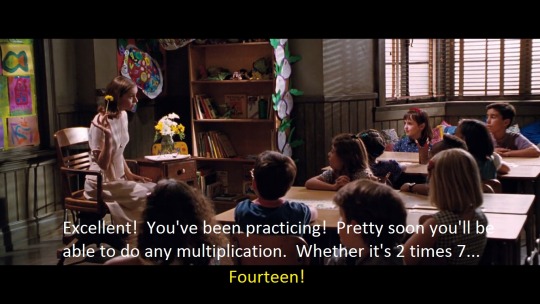
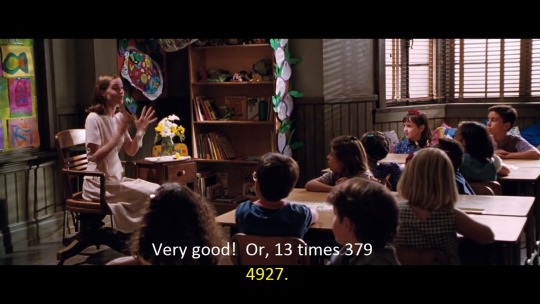


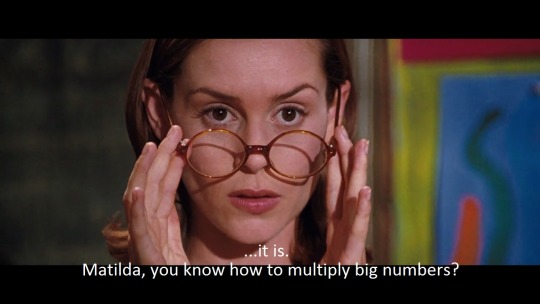
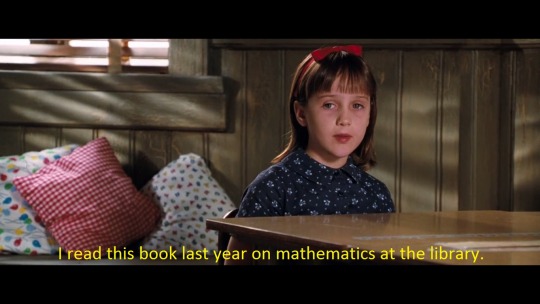




This scene will forever be the most important scene in any movie to me. This is a little girl who has been told all her life by her parents that she is a mistake and that she is worthless. This is a little girl whose family life is so horrible that books are her only escape. This is a little girl whose parents constantly belittle her for reading, the only pleasure in life she has. And in this scene, this little girl answers very shyly, because she has been conditioned to be embarrassed of her own existence. At first, she answers slowly, and without making eye contact. And in this scene this little girl is beginning to realize that maybe she is special. Maybe there are kind people in the world. Maybe she is worth something.
594K notes
·
View notes
Text
How I did well in the UKCAT
Its worth saying that I applied to medicine twice before getting in, the UKCAT score I got the first time was well higher than the second time. My application was strong enough to receive offers from higher UKCAT threshold universities as well my back up non UKCAT assessing university.
I decided to write this post because I found my old notes on how I organised my mind to do well in the UKCAT and thought I’d share with the Medblr community.
Here goes!
Verbal Reasoning (650)
Read the question/statement and allocate a keyword!
Skim passage, try looking for the keyword.
If its there, read the sentence before and after and decide between true, false and can’t tell.
If you can’t decide between them. Flag and move on.
If you cant find the keyword. Flag and move on. Its not worth wasting time deciding whether or not you’ve selected the correct keyword.
Abstract Reasoning (750)
If anything I practiced this the most and scored high in it. The way I arranged my mind for this section is as follows
I formed a set of categories upon which I scanned each question and decided which category it best fit.
The categories were; shape, colour, number, arrangement and the WHAT THE ABSOLUTE HELL category. Usually in that order.
These categories have sub categories too. For example: type of shape, features of shape that repeat in the set ( e.g. a triangle in each set). It does get more complicated sometimes where categories intermix, like 1 fully shaded triangle in the right hand corner of each box in the set.
Breathe, I know that was a lot to read. Practice makes you faster.
When your in the WHAT THE ABSOLUTE HELL category, guess, flag and then move on. You most likely won’t have time to come back to this. Make an educated guess. Flagged is incase you have time to have a second look.
Quantitate Reasoning (820)
Im being truthful here and telling you I hardly practiced QR. Im really good at mental maths. Seriously I never used the calculator throughout this section on the UKCAT and here are some tips.
READ my child READ! Because sometimes you dont need to look at the information given at all. Sometimes everything you need is in the question itself. Best believe it.

Round, saves SO much time. If the options are in close range, round smaller.
If you’re not good in maths, practice as much as possible. Revise your times tables and know the basic formulae for area, volume, perimeter etc. Revise stats and make sure you know how to do basic ratios, percentages, mean, range etc. Make sure you know how to read a graph.
Flag anything that you dont get first time and move on. If something is time consuming, its worth moving on and finishing the easier ones.
Decision Analysis (500)
I still cry at this. WHY?
Funny enough, after AR I practiced this the most. When I tested myself this section was always my highest score. Funny.

My tips if you choose to take any is:
Don't dig deep into this too much. You begin to confuse yourself dreadfully.
Take your time, these are all supposedly do-able. So each one you get is one worth getting correctly.
Look for words that indicate what the sentence is about.
Situation Judgement Test (Band 1)
I scored Band 1 both times when I did the UKCAT. The first time I did it, SJT was still being trialled. My main tip for this: Read the GMC guidelines for doctors and medical students. This is what structured my way of thinking in both a professional manner and an empathetic one. Its worth reading.
Extras
Flagging is your best friend.
Love it because hating it will only discourage your preparation. Love it LOVE IT, you can hate it when its over.
If you begin to fluster during the exam because its the third question you’re flagging because you really don’t know whats going on. Take a moment. Tell yourself that you got this. Im telling you YOU GOT THIS!
Dont go back, move forward. Even if you’ve flagged ten in a row move forward and only go back once you’ve been through them all.
Each question is worth a point. Whether the question is easy or hard, its still worth the same. This is why I tell you to flag the tricky ones and do all the easyish ones.
Sleep the night before and have breakfast. Stimulate your brain.
I know this gives me a rather average overall score (goddamn you DA) but it was good enough for all the medical schools I applied too.
Good luck!
294 notes
·
View notes
Text
UCAT/BMAT preparation notes
(This is not a studyblr. I just want to post something that I wrote ages ago and hopefully it will be useful to someone. Though I am happy to answer questions.)
so it’s summer and time for test preparation. Here are my notes for UCAT and BMAT, as someone who’s taken each of them twice.
UKCAT (second time) 3000
BMAT (second time) 7.3, 8.6, 4A
UKCAT preparation (They renamed it UCAT I think. I am not absolutely sure if these notes are still applicable.)
I did all the free practice questions on the official UCKAT guide. Whilst The Medic Portal UKCAT question bank was still free, I finished about 90% of all questions. Overall I think it was a really good source with realistic questions.
The amount of time needed for preparation is really different for everyone. I’d rather start early, try a few problem sets, and plan from there.
Verbal Reasoning: Read the questions first before reading the article. Scanning didn’t work for me as a non-native English speaker, so I just tried my best to read as fast as possible.
Quantitative Reasoning: Familiarise yourself with all the common formulas, and improve your mental arithmetic bit by bit. The official practice questions were generally harder than the ones in the actual test. The numeric keypad was a lifesaver. Again scanning didn’t really work, so I consciously read every word.
Decision Making: There are several types of DM questions, and the only one I struggled with was Evaluating Argument. (It often turned out that my common sense was a bit different to everyone else’s, oh well…) Pick the strongest and most logical argument, even if it sounds ridiculous to you. You might be able to first exclude the arguments with inappropriate assumptions or those irrelevant to the question.
Abstract Reasoning: I have no idea. I wasn’t able to memorise any of those mnemonics, so I just practised a lot to find the ‘sixth sense’.
Situational Judgment Test: Good Medical Practice guide from GMC website is a must read. Here are a few things I jotted down, but of course you can make your own notes after lots of practice.
Very appropriate=addresses at least one aspect of the situation. Appropriate but not ideal=no bad consequences, but not very wise. Inappropriate but not awful=shouldn’t really be done, but no terrible consequences. Very inappropriate=makes the situation worse.
Very important=vital when deciding to do or not to do. Important=useful but not vital. Of minor importance=can be taken into account, but doesn’t really matter if it’s considered right at that moment. Not important=completely irrelevant.
Medical students cannot give any medical advice to patients or family members.
Apologising on someone else’s behalf (when they are indeed wrong) is appropriate but not ideal.
For problems in group work, you should first try to solve locally. You should encourage everyone to contribute. You must not exclude anyone from discussion. Asking for tutor’s advice is appropriate but might not be ideal.
Future grade/assessment is not important at all when you’re considering reporting someone’s behaviour.
You cannot ignore a friend’s inappropriate behaviour or expect the friendship to affect anything professional decision.
It is very appropriate for a medical student/junior doctor to consult a senior doctor.
You should refuse the ‘wrong’ kind of help, but make use of available resources.
You should not appear insensitive even when you cannot provide sth.
You cannot discuss a mistake right in front of a patient.
Other people’s professional opinions are (very) important.
You cannot compromise quality of service.
You cannot blame anyone for anything before gathering enough evidence.
It is important that the patient understands everything and errors are corrected ASAP.
Patient history is important.
People who’re in need of urgent help should be prioritised.
BMAT preparation
I did every official practice paper at least twice. I also finished the book The Ultimate BMAT Guide 600 Practice Questions, which was very helpful with explained answers and good tips. (If you’re concerned with the cost) I used a very cheap second-hand copy. The main idea is to practise as much as possible, and also to reflect once in a while.
If you’re anxious about the timing, just try to think ‘one question at a time’. I liked to check the time after every single question, but this might not work for other people.
Section 1: The school curriculum in my country doesn’t even mention money exchange. You will need to familiarise yourself with playing cards, public transport timetables, loans, etc. For those data analysis problem sets, I preferred to read the questions first and then scan the article and graphs. I always, always ran out of time, so when there was only two minutes left I would roughly scan the unanswered questions and choose the answers that seemed most sensible, and then I would return to whatever question I was working on.
Section 2: Even if you take biology and chemistry to A-level/IB, there might still be something that you don’t know about, so those sections are worth a thorough check. With the invaluable help of a friend who studied physics in IB, I made sure that I understood all the formulas and when to use them. There were also some miscellaneous things that needed to be memorised.
Section 3: I did all the past questions from 2012 to 2017 at least once. Having done IB History and TOK, I was pretty comfortable with writing about things that I didn’t want to write about. I noted down all the key concepts in medical ethics and many examples that could be used. A habit to read around science and think about ethical issues definitely comes in handy.
153 notes
·
View notes
Text


1:06 PM | lord forgive me for I have turned on lofi beats to study and chill to
1K notes
·
View notes
Photo


i truly did not think my final paper was very good at all, but i just got my grade back and i am in tears
215 notes
·
View notes
Text
weird study tip:
if u don’t feel motivated, pretend ur in a movie or tv show. you know the scenes where they’re on their bed with their feet tucked up and crossed at the ankle, and they’re cracking open highlighters with their teeth and poring over a textbook with smooth rock music playing? that. bonus points for a perfect messy bun and spencer hastings outfit.
21K notes
·
View notes
Text
I
dark academia & science
as much as we all adore the profusion of the arts and humanities across this genre, please stop for moment and consider this alongside them: science, and more specifically, medicine, in relation to dark academic texts.
think about pale-eyed boys and dark-haired girls who always carry the scent of formaldehyde around with them like cologne or perfume. it is this, and not any trace of cigarette smoke that might cling to the collars of their peers, that makes them smell like death. for whatever else they might be, they’re not stupid, and they’ve seen the damage that those things can do to even the healthiest pair of human lungs.
and when you think about them, think also of dark and bitter chocolate; of spice jars stacked up in the kitchen; and of one hundred and one different herbal teas, all brewed at home from the plants that sit on every window sill, and every spare surface that is not taken up by stacks and stacks of books.
think of late nights spent in the darkest nooks and crannies of the library. not just in the study of anatomy and physiology, either, but also in the study of astronomy, psychology, languages, philosophy, literature …
think of those scholars, obsessed with mary shelley’s frankenstein, some of whom now posses the knowledge to recreate it. or so they think. think of them in graveyards in the early hours, digging, knee- and elbow-deep in the dirt.
think of the eery blue light of bunsen burner flames flickering in a room that is otherwise dark, while substances and solutions bubble away above them. the girls who brew these potions form a new kind of coven of witches, whose goddess is Science, and whose goal is Knowledge.
think of plague doctor masks hanging on the walls.
think of cold hands and chapped lips and some skin being so pale that it’s almost translucent; of veins that stand out like a roadmap in their wrists, coloured in purple, blue and green; of hollow eyes, which are also purple, and this because of exhaustion.
they seem so fragile. but what about the boys with stitches and scars underneath their smart clothes, and slings upon their arms? these are boys who will break their own bones and each others’ in the name of perfecting their craft.
think of the experiments that they will all conduct, both the physical and the psychological; think of all the journals, filled by several spidery hands at once, by obsessive scrawls that spiral rapidly towards the illegible as they discover something they could have scarcely even imagined before.
think of how foreign latin and greek feel upon their tongues until they really immerse themselves in the history of medicine. the different traditions. the diverse cultures. soon they are reading and speaking these languages with ease, and ancient persian and mandarin too.
think of the diagrams they draw, the details of which have been painstakingly copied from their source text. think of boys with pencils tucked behind their ears, and of girls with their long hair trailing into their ink wells.
think of dark academia & art.
think of dark academia & literature.
think of dark academia & philosophy.
think of dark academia & science.
think of dark academia & medicine.
4K notes
·
View notes
Text
reasons to live: spring edition
the days are getting longer and you can feel new energy building up inside of you
the green is getting greener
the first serenade performed by the birds when the sun hits their nests
when the sun hits your own face and you can feel the warmth of the sunrays
life adding splashes of colour to your surrouding when the flowers are starting to grow
the people around you are getting happier
the feeling of wearing sneakers after months of awkward boots
the joyful laughter from children who finally feel brave enough to face the world after a long period of darkness
the smell of spring
you can open your windows and let the air freshen up your house
the first bees and butterflies venture forth
your mind is clearer and you thoughts are brighter
seeing the spring rain through the rays of sun
you know summer is getting closer
9K notes
·
View notes
Text
due to personal reasons i will be passing all my finals
133 notes
·
View notes
Photo

this is the perfect grade of good luck
reblog in 5 seconds and all of your grades will inch ever closer to perfect
493K notes
·
View notes
Text
Tips for students
On daily routine:
- As soon as your alarm goes off, sit up in your bed and turn it off. Don’t press snooze, it will only become harder to get up.
-Always have a glass of water next to your bed, so when you wake up, you can drink as soon as you are up. If you like, you can put cucumber in it, it will be even more refreshing.
-Put on your socks and a pullover or sweater or nightrobe or whatever you like, and go to the bathroom.
-Wash your face, then use your face creme if you like.
-Have breakfast if you have time and appetite for that.
-Then wash your teeth, and use some lipbalm if you like.
-Dress up in an outfit THAT YOU FEEL GOOD IN. (Also don’t forget about the weather… take care of yourself.)
-Pack your lunch, check if you have everything important (keys, phone, money, ID, etc.)
-On the road, do something that puts you in a good mood, or prepares you for the day. For example, you could catch up on your reading, revise the things you’ll do that day, run through your notes if you have a test that day, listen to music, etc.
-DON’T TAKE LOOOOONG NAPS IN THE AFTERNOON. It may feel as the most refleshing thing, but you will regret it: you lose a lot of time, and the worst is, that you won’t sleep thight that night. MY TIP is to rest for 1- 1 and a half hours when you get home. You could eat something, or rest your head for a good half hour. Then start studying. If you really can’t focus on studying after a long day, that’s totally fine. Go to bed a bit earlier, and wake up earlier as well! You’ll see that in the morning, you will be more efficient, which will keep you moving all day long.
-DON’T DRINK CAFFEINE IN THE AFTERNOON- it’s the same as naps, but (for me) it’s totally worse!!!!
On self-care:
-drink water
-eat when you are hungry
-go to bed in time
-every Sunday, make your night a self-care night (long bath, hairwashing, face hydratating, manicure, pedicure, anything you like…)
-use face scrub twice a week
-wash your face twice a day
-don’t sleep with your make up on
-wash you hair 3 times a week
On studying:
-stay motivated: always set your goals, make your notes nice looking, so you want to study from them, WATCH GILMORE GIRLS (idk if it’s just me, but it inspires me a lot)
-know what type you are (visual, auditive, kinesthetic)
-if you are feeling tired, but want to study something, watch documentaries
-always be prepared
-throw away old pens and pencils
-TURN OFF YOUR PHONE
-teach kids or your classmates on materials you don’t want to forget, or is hard for you to study (for ex.: I teach children English, because currently it’s not among my subjects at school; and I became good at maths thanks to my friend, who never understood a word, and I had to teach her the material. Thanks to that, now we both know maths.)
9K notes
·
View notes
Text

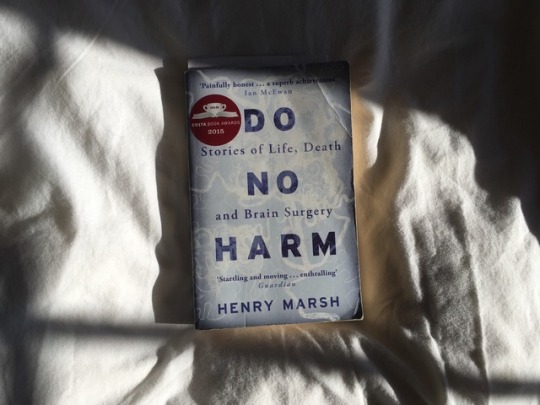
02.02.2019 [ 2 / 100 days of productivity ]
Early morning chemistry and Henry Marsh ✨
#studyblr#studyspo#study motivation#a levels#alevelblr#student#study notes#notes#mine#a level chemistry#chemistry#reading#bookblr#science#Henry Marsh#Neuroscience#study#studying#studyybea
1 note
·
View note
Text
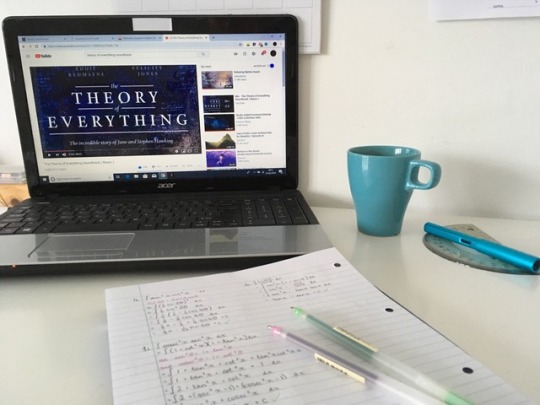
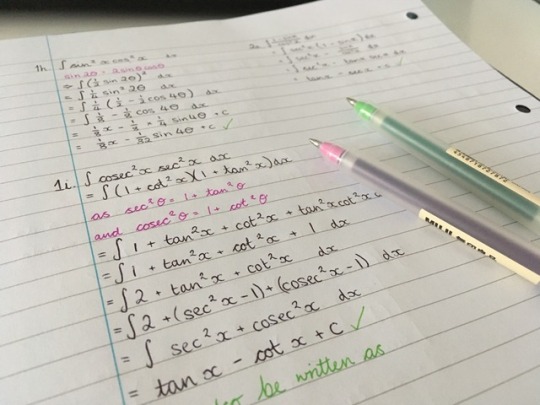

01.02.2019 [ 1/100 days of productivity ♥ ]
Snow day ft The Theory of Everything soundtrack and Trigonometric integration ⛄️✨
#studyspo#studyblr#study motivation#mathematics#a levels#alevels#alevelblr#snow#100 days of productivity#a level biology#a level chemistry#a level maths#edexcel#a2#notes#student#study notes#studying#mine#studyybea
16 notes
·
View notes